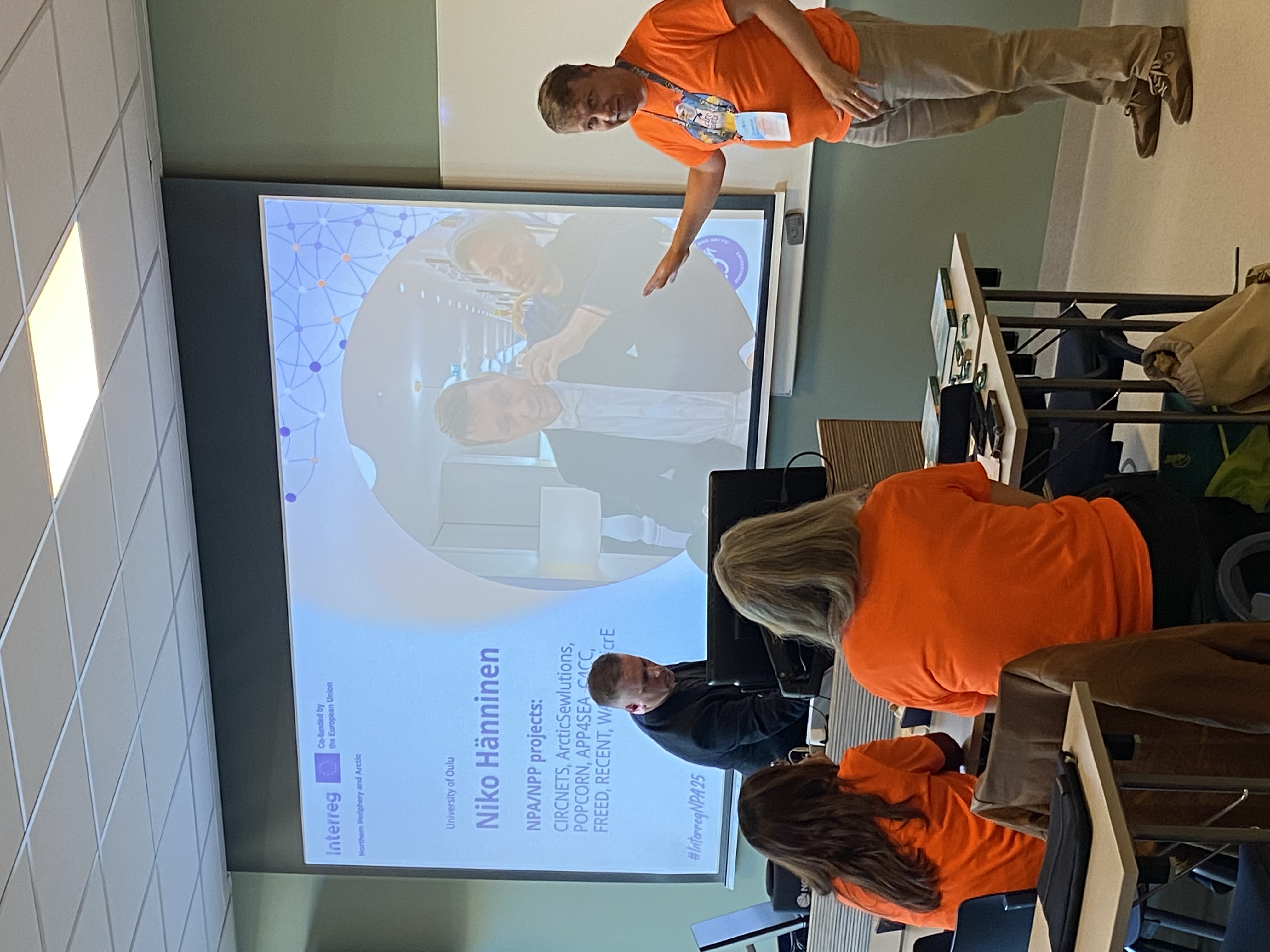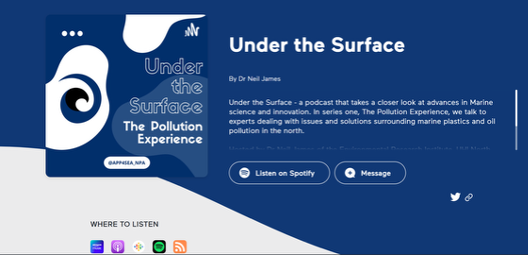From Awareness to Action: Ten Years of Tackling Marine Plastic Pollution in the NPA Region
The CIRCNETS-led Building Blocks session, traced a decade of NPA work on reducing marine litter from end-of-life fishing gear. Four interconnected projects were presented, each advancing circular solutions for discarded nets and ropes.

The CIRCNETS-led Building Blocks session, From Awareness to Action: Ten Years of Tackling Marine Plastic Pollution in the NPA Region, traced a decade of NPA work on reducing marine litter from end-of-life fishing gear. Four interconnected projects were presented, each advancing circular solutions for discarded nets and ropes.
Dr. Neil James introduced Circular Ocean, which first highlighted the economic potential of recovered fishing gear. Blue Circular Economy (Dr. Richard Glavee-Geo) built on this by developing concrete business and cluster opportunities for SMEs. POPCORN (Niko Hänninen) then brought together multiple marine-pollution projects to expand outreach and transfer results across programmes. Finally, representatives from CIRCNETS outlined current efforts to help regions prepare for new EU requirements on extended producer responsibility and improve systems for collecting and recycling fishing gear.
Together, the projects illustrate how the NPA has progressed from raising awareness to enabling practical action, adapting to policy changes and building continuously on previous results to tackle marine plastic pollution across the region.
Session materials
Explore the session summary and access the presentations and podcasts featured at the event.
During the NPA’s 25th Anniversary conference, CIRCNETS project organised a parallel session on the first day of the conference, which was part of the Building Blocks session. The session, From Awareness to Action: Ten Years of Tackling Marine Plastic Pollution in the NPA Region, demonstrated how different NPA funded projects have taken on this challenge.
The audience were introduced to four NPA projects, each aiming to increase knowledge on the circular solution opportunities regarding end-of-life (EOL) fishing gear, with the overall aim of reducing fishing gear litter in the oceans.
The session was hosted by Dr. Neil James from the Environmental Research institute, North Highland College UHI in Scotland, who was the coordinator of the Circular Ocean project (2015-2018). Marine plastic pollution hit the headlines on a big scale in the mid 2010’s, and Neil presented how the hidden economic opportunities of discarded fishing gear came to be in the focus of Circular Ocean.
These themes related to green economies and business opportunities for remote and rural coastal regions were developed further in the following project Blue Circular Economy (BCE, 2018-2021), which was presented by Dr. Richard Glavee-Geo from Norwegian University of Technology and Science. More concrete measures were sought by the BCE, including sustainable business opportunities for SMEs and development of clusters, which could realize the hidden economic opportunities of discarded fishing nets and ropes.
Circular Ocean and BCE were both part of a call project POPCORN (2021-2022), which was presented by Niko Hänninen from University of Oulu, Finland. POPCORN was not just a catchy abbreviation, it was clustering project, which brought together four projects dealing with marine pollution. The aim of the project was to increase the outreach of project results, to share these with new target groups, and some of these were repackaged and presented in new forms, in podcasts, in dissemination campaigns. One of the projects was from Baltic Sea region, the other three were NPA projects, so the project was truly a cross-programme project. The results were taken beyond the NPA region and vice versa.
Simultaneously with these three above-mentioned projects, there had been significant policy changes on the EU level to combat marine plastic pollution. The SUP directive had been accepted by the European Parliament in 2019, which brought significant changes to the waste management of fishing gear. Extended producer responsibility (EPR) was to be applied to them after a transition period, meaning that the producers of plastic containing fishing gear must organize a separate collection for them. This marked the starting point for CIRCNETS (2023-2025), and Charlotte Berg from Sotenäs Municipality in Sweden and Paula Costa Domech from University of Galway discussed their part in this project.
Getting ready for the EPR, how to organise the separate collection of EOL fishing gear, how to recycle the collected fishing gear waste – these issues are in the center of CIRCNETS. The common challenge, which the regions throughout the NPA programme face, is again being addressed by an NPA project.
With legislation changing, awareness of plastic pollution rising, and the NPA program developing over the years, the four projects have also evolved, which was highlighted in the session. The projects have built on the outcomes and results of one another while also being proactive and looking ahead at legislative changes. In all the projects, raising awareness has been one of the key aims, as well as presenting specific and concrete actions that can be taken. This was clearly demonstrated in this parallel session, which summarized a decade of efforts to tackle marine plastic pollution in the NPA region – from awareness to action!
Download the presentation - please note that the videos included in the slides do not appear.
Under the Surface - a podcast that takes a closer look at advances in Marine science and innovation. In series one, The Pollution Experience, we talk to experts dealing with issues and solutions surrounding marine plastics and oil pollution in the north.
Hosted by Dr Neil James of the Environmental Research Institute, UHI North Highland, and part of the POPCORN project, and funded by the Northern Periphery and Arctic Programme, through the EU's Interreg programme
popcorn.interreg-npa.eu/





